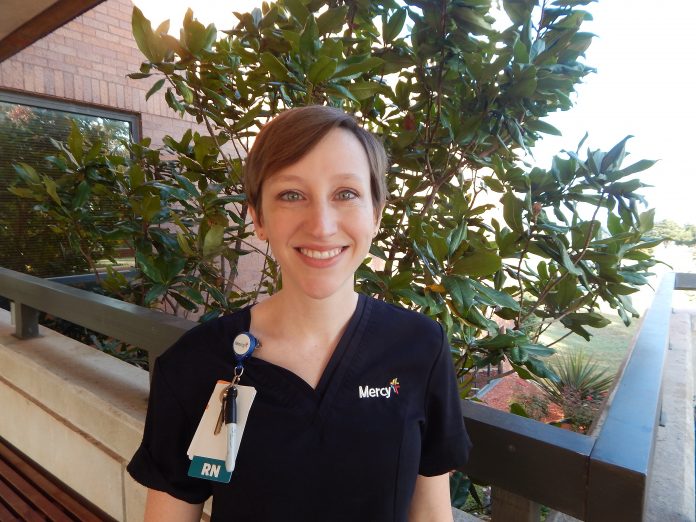
by James Coburn
Staff Writer
Jessica Zan particularly loves rural health care. It’s an extremely powerful way to practice health care, said Zan, RN, manager of Med/Surg Nursing Services at Mercy Hospital Logan County.
“I’ve been a big city girl in a big city hospital for my whole career,” Zan said. “And I had no idea until I got out here the kind of power that is in rural health care.”
Rural health care attracts dedicated health care workers to the nursing profession because they want to live in the community they serve, she said.
“This is their hospital and they see their patients at Walmart,” Zen said. “This is what we do here. If we don’t get this right, we suffer as well as our health care consumers.”
Mercy Hospital Logan County is a small group of highly motivated people including Zen. She has been with Mercy since 2003 and is a 2005 nursing school graduate from the University of Central Oklahoma. She took a little time off from Mercy Hospital in Oklahoma City to go to graduate school in Texas to get a master’s degree in counseling psychology. Just before she took her current job in March, she took a few months off to be a stay at home mom.
One month before she moved to Guthrie, her husband lost his job, and Zan wanted to go back to work anyway. Her position came open the same week and she fell in love with the idea of rural health care.
Her job provides her the opportunity to bring a lot of her varied skilled sets and education into one focus.
“I firmly believe primarily that I am here to serve the people who serve the patients,” Zan said. Her psychology background, experience as a nurse on the floor and consulting in different roles provides Zan the opportunity to bring all of her skill sets into one facility.
Mercy Hospital at Logan County is small enough that if nurses want to make a change, sometimes they make the change that day. They don’t have to go through hundreds of layers of research and committees.
“We do our best practice research. We make the decision. We enact the decision,” Zen said. “And everybody learns about it because it takes us two or three shifts to get the message out to everybody.”
So there is a lot of power and flexibility among the nursing staff. Being a small group allows them to meet and take better care of one another, she continued.
Mercy Hospital Logan County is also the largest of Mercy’s rural hospitals. It is also large enough that when a change is made, it makes a difference for the community, Zen said.
“In the last six months, we went to being the No. 1 in patient satisfaction scores in the Mercy ministry. Two quarters ago we were third in the ministry; both times ranking in the top 10 percentile,” she said. “It’s very encouraging.”
The hospital is fully staffed. When Zen first arrived at the Guthrie hospital, its census was down by eight nurses, two house supervisors and two nursing assistants. Zen said the environment Mercy is creating in Guthrie is a place where nurses want to be. It is also a place where their patients are telling them, they get highly personalized, individualized intimate care.
“That is a powerful thing,” she said. “I love getting to be a part of that.”
As a leader, Zan tries to talk to her staff everyday asking what they need to change for the betterment of patient care. She learns who needs to be recognized for exceptional work.
“I try to make a presence to my day shift and my night shift,” she said. “So I show up at their shift change. That’s when I get here several days a week. I get here around 6:30 a.m. I firmly believe that the folks out their practicing are the experts in their practice. And if I am the person who serves the people who serves the people, then I need to be listening to the experts and I need to take their word for it when they say something could be better, something could be fixed, or here’s a new way to do something.”
Mercy is also experimenting to build a formal Shared Practice Council in a new way. They are building it in virtual space rather than in real space, she said. The advantage of virtual space is attendance, which is always difficult in a 24 hour facility.
“If you hold a meeting (in real space), you are by design neglecting somebody who is working that day who may want to be there,” Zen said.
Her hope is that she is creating a space where people believe in their own power.












